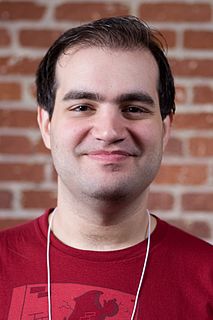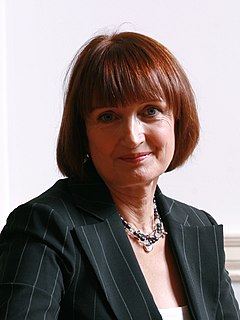A Quote by Clifford Stoll
Here are my strong reservations about the wave of computer networks. They isolate us from one another and cheapen the meaning of actual experience. They work against literacy and creativity. They undercut our schools and libraries.
Related Quotes
I don't know where creativity comes from, but I think everybody has the ability to be creative. I think what's important about creativity starts when you're very young and how we're allowed to experience our imagination. The people who bring us up and teach us are fundamental in either encouraging creativity or discourging creativity. My imagination was always encouraged.
I have always had a special affinity for libraries and librarians, for the most obvious reasons. I love books. (One of my first Jobs was shelving books at a branch of the Chicago Public Library.) Libraries are a pillar of any society. I believe our lack of attention to funding and caring for them properly in the United States has a direct bearing on problems of literacy, productivity, and our inability to compete in today's world. Libraries are everyman's free university.
Man is about to be an automaton; he is identifiable only in the computer. As a person of worth and creativity, as a being with an infinite potential, he retreats and battles the forces that make him inhuman. The dissent we witness is a reaffirmation of faith in man; it is protest against living under rules and prejudices and attitudes that produce the extremes of wealth and poverty and that make us dedicated to the destruction of people through arms, bombs, and gases, and that prepare us to think alike and be submissive objects for the regime of the computer.
Most people would say they live with an internal angst that they can't always put their finger on. This is because the Internet has changed our very way of being in this world, compelling us to be perpetually "on" - from our cars to our computers, our tablets to our smartphones, our desks to our living rooms or dining tables, our churches to our libraries to our schools.
Everybody wants to have sex - you don't have to have a baby when you're 16. You don't have to do drugs. I think our Sunday schools should be turned into Black history schools and computer schools on the weekend, just like Hebrew schools for Jewish people, or my Asian friends who send their kids to schools on the weekend to learn Chinese or Korean.
Progress in computer science is made with the distribution of revolutionary software systems and the publication of revolutionary books. We don't need a fancy information system to alert us to these grand events; they will hit us in the face. Another good excuse for ignoring the literature is that, since everyone has strong beliefs about fundamentals but can't support those beliefs rationally or consistently convince non-believers, computer science is actually a religion.



































